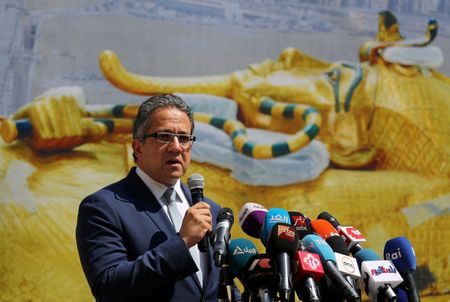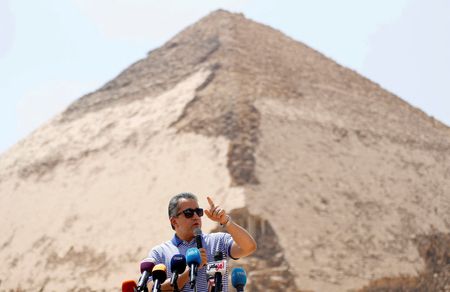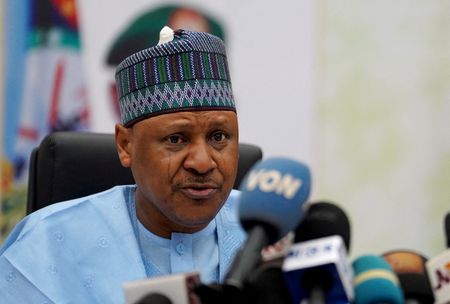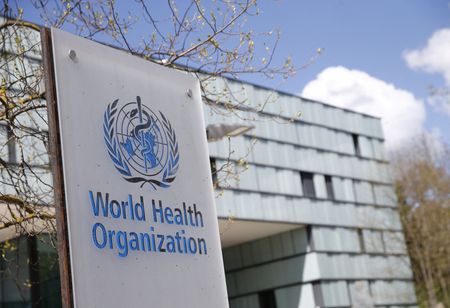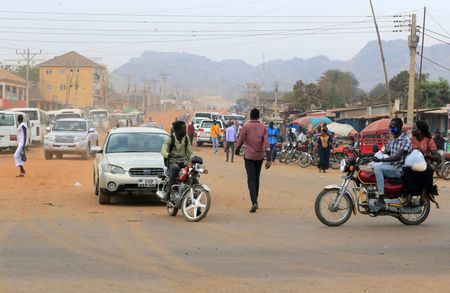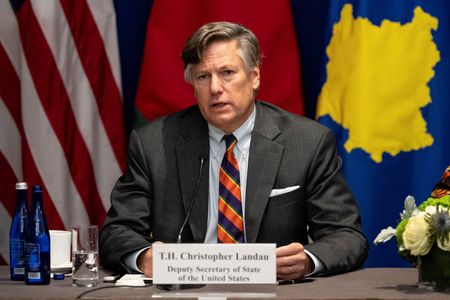By Mohamed Ezz
CAIRO (Reuters) -Egypt’s former tourism and antiquities minister Khaled El-Enany is set to be confirmed as head of UNESCO on Thursday, despite criticism from heritage groups that he had failed to protect cultural treasures at home such as Cairo’s “City of the Dead”.
Enany, 54, was elected last month by UNESCO’s 58-member Executive Board with 55 votes, beating Edouard Firmin Matoko of Congo-Brazzaville. His appointment as the first Arab director-general of the U.N. cultural and education agency will be put to a formal confirmation vote of all 194 member states at the agency’s general conference in Samarkand, Uzbekistan.
PARTS OF HISTORIC SITE DEMOLISHED
The Berlin-based NGO World Heritage Watch last week urged countries to reconsider the appointment, arguing that Enany’s record as minister raised questions about his commitment to preserving cultural sites.
In a letter signed by more than 50 organisations and experts, it cited the demolition of parts of Cairo’s historic necropolis, the “City of the Dead”, and the expansion of tourism works near St Catherine’s Monastery in Sinai, both UNESCO World Heritage sites.
“It is irresponsible to entrust someone with such a past with the top job at the organisation responsible for preserving world heritage,” the group said.
Reuters was unable to reach Enany directly for comment. Before last month’s executive board vote, his campaign said he was too busy to respond to questions sent by Reuters about criticism of his record. The campaign added in a statement that “the unfortunate mega-project that the government decided to carry out in the St Catherine’s area is currently halted”.
Following his election, the campaign declined to comment further and referred the questions to the UNESCO Secretariat, which did not immediately respond to a Reuters request for comment.
‘ERASING EGYPT’S HISTORY’
An Egyptologist and former museum director, Enany served as minister from 2016 to 2022. UNESCO documents describe Enany’s former ministry as the “official entity responsible” for UNESCO World Heritage property in Cairo’s historic area.
Conservationists argue that gave the ministry a duty to map and register assets, set site boundaries, press for impact assessments before launching projects and object when those projects threatened what UNESCO dubs areas of outstanding universal value.
Instead, they say, highway and bridge projects that accelerated from 2020 cut through swathes of unregistered mausoleums in the “City of the Dead”, a 10 sq km (3.9 sq miles) necropolis fringing eastern Cairo.
Many families still bury their dead in the area, amid ornate tombs of Mamluk sultans, nationalist leaders and Islamic scholars such as Imam al-Shafi’i.
“What happened in the cemeteries is erasing a huge part of Egypt’s history,” said heritage advocate Sally Soliman, who has filed lawsuits to stop demolitions.
Egypt’s government has defended the developments, saying registered monuments were spared and that infrastructure work was essential to revitalise tourism and modernise Cairo.
In South Sinai, critics say the “Great Transfiguration” project that began in 2021 around St Catherine’s Monastery replaced a small visitor centre with large domed buildings that clashed with the ancient site’s design and setting.
UNESCO’s World Heritage Committee earlier this year requested an expert mission to assess the site.
DIPLOMATIC MOMENTUM
Despite the controversy, Enany’s bid has drawn strong support from Arab and African nations, which have long sought greater representation at the helm of the organisation.
“Egypt’s candidature is overdue representation,” Foreign Minister Badr Abdelatty said in Paris last month. “We have to lift this historical injustice to Egypt, to the Arabs, to the Muslims, and to the Africans.”
Enany has pledged to “build a UNESCO for the people”, streamline decision-making and diversify funding as the agency braces for the withdrawal of U.S. financial contributions at the end of 2026.
A UNESCO spokesperson said the election of the director-general was “a sovereign decision of member states”.
If confirmed, Enany will take office in mid-November, succeeding France’s Audrey Azoulay, who has completed two four-year terms.
(Reporting by Mohamed Ezz; Additonal reporting by John Irish; Editing by Alexander Dziadosz and Alex Richardson)

